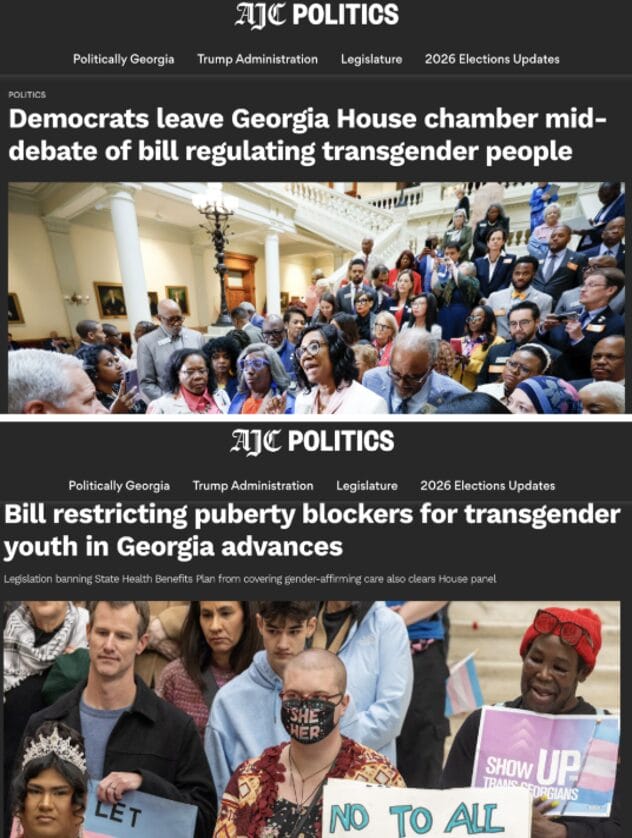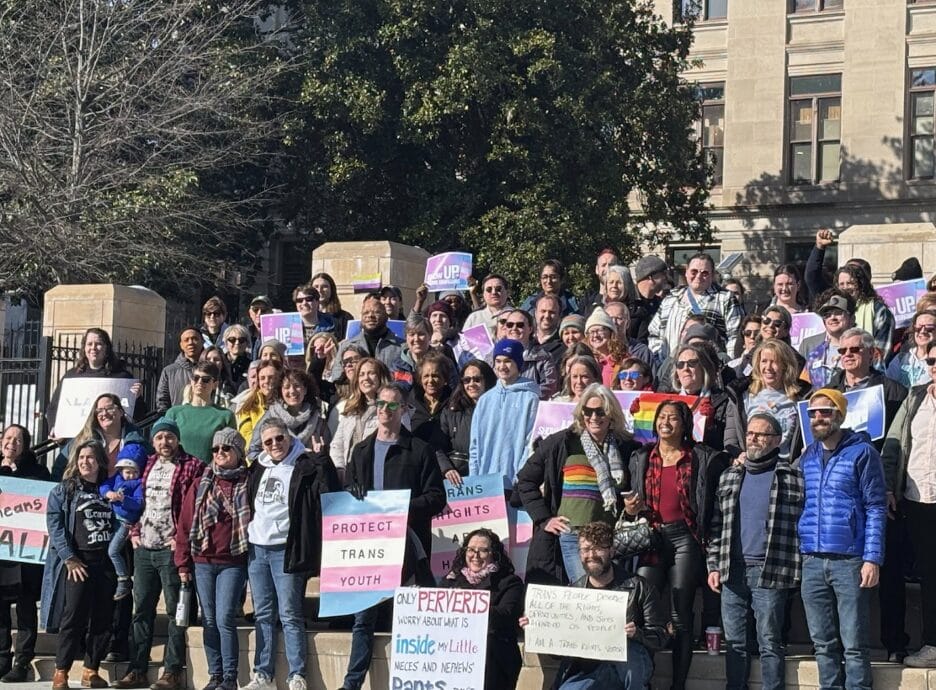In the 2025 legislative session, Georgia lawmakers proposed, debated, and a majority voted to pass three bills targeting LGBTQ people, youth and allies. GLAAD has evaluated news coverage of the legislature’s actions and lawmaker rhetoric to see whether a transgender person was interviewed in stories about legislation targeting transgender people, whether a parent of a trans youth was included in a story about essential health care, and whether the coverage included context to counter false and baseless claims.
GLAAD evaluated 95 related stories from seven of the state’s top media outlets published between January and May 2025.
The coverage evaluation reviewed news stories about a bill targeting transgender people and youth to include school participation in sports (SB1), denial of necessary medical care for transgender inmates (SB185), and a bill allowing discrimination based on religious exemption (SB36), all signed into law by Gov. Brian Kemp.
In addition to evaluating coverage based upon the inclusion of transgender voices or an LGBTQ person directly impacted by anti-LGBTQ legislation, GLAAD also considered whether voices from a queer or transgender-led advocacy group were included in media coverage about the community. Exceptional reporting provided context about the transgender community, and included any history of anti-LGBTQ advocacy or political ties to The Trump White House by lawmakers seeking to restrict the rights of transgender and gender diverse Georgians.
The results were mixed, amplifying an opportunity for journalists to not only report the facts about LGBTQ stories but also to prioritize queer and trans voices in stories about their lives. Of the stories GLAAD assessed, only 25 of 95 stories included at least one quote by a transgender person or a parent of a transgender child.
Additionally, GLAAD analysis found:
- 30 of the 95 stories included some degree of context to contrast anti-transgender bill proponents’ inaccurate and harmful rhetoric.
- 42 of the 95 stories that did not include a transgender person also did not include a quote from a lesbian, gay, bisexual, or queer, nonbinary, intersex, two-spirit, person or group.
- Only 9 of the 95 stories included quotes from professionals with experience in the topics being discussed.
The seven Georgia news outlets assessed included The Atlanta Journal-Constitution, Georgia Recorder, Capitol Beat, 11Alive, Georgia Associated Press, Macon Telegraph, and Savannah Morning News. GLAAD documented when a story about transgender people included a transgender voice, finding:

- Atlanta Journal Constitution: 4 of 23 stories
- Georgia Recorder: 8 of 18 stories
- Capitol Beat: 2 of 16 stories
- 11Alive: 2 of 7 stories
- Georgia Associated Press: 2 of 7 stories
- Macon Telegraph: 4 of 13 stories
- Savannah Morning News: 2 of 11 stories
In two AJC stories covering the legislative debate regarding transgender Georgians and legislation aiming to restrict necessary medical health care for transgender youth in the form of puberty blockers, AJC reporting failed to include transgender voices about the proposed legislation and its impacts. The story did not include background facts or context from a health care provider or researcher to counter proponents’ rhetoric, such as the fact that the care is supported by every major medical association, or that the same treatments being banned for trans youth have been prescribed for decades to cisgender people and youth.

Georgia Recorder, led by editor Jill Nolin, with reporting by Ross Williams, more consistently sought out and included transgender voices and parents of transgender youth in reporting on the bills and their potential impact, including in this piece. A parent told Georgia Recorder that the ‘constant stream of bills aimed at transgender Georgians, especially youths, make her daughter, who is otherwise thriving in school and happy with her identity, feel targeted.’
“My daughter just wants to live her life,” the parent said. “She wants to go to school every day. She wants to play with her friends on the weekend. She wants to participate on sports teams with her friends, and these constant attacks on who she is as a person and the scrutiny that it brings on her life and in our family’s life every single day is harmful. She is a target every single day without people realizing it just because she is who she is.”


“Empowering transgender people to speak to the current anti-trans narrative portraying our humanity as illegitimate will help dispel the fear amplified across polarizing echo chambers attempting to vilify our existence,” said Gabrielle Claiborne, Atlanta-based trans activist and CEO of Transformation Journeys Worldwide. “Reporters have a responsibility to push back on inaccuracies that inflict harm on the transgender community by centering our voices as a part of the solution.”
GLAAD’s Media Reference Guide offers reporters guidance for covering LGBTQ people and 23 subject areas, created in consultation with experts in the topics, to urge more accurate and inclusive stories.
Additional best practices for reporters and newsrooms covering state legislation:
- Seek and include LGBTQ voices in stories about LGBTQ people. If specific to transgender people, seek and include transgender voices.
- Center facts over rhetoric. A quote from a transgender person is essential, as are facts to challenge or contrast elected officials’ rhetoric.
- Include context and potential consequences on impacted communities.
- Verify and ask for evidence to back up claims made by elected officials, rather than leaving it to readers/viewers to decide what is fact or fiction for themselves.
- Terms to avoid: “Gender ideology,” “transgenderism,” “biological boy/girl.” These are inaccurate terms not used by transgender people or the medical community. They are terms used to dehumanize trans people and undermine authentic identity.
GLAAD offers briefings for local and national newsrooms to review terminology, best practices, and to connect reporters and editors to local LGBTQ leaders, advocates, and everyday queer people, to improve the accuracy of news stories and to reflect local audiences who are LGBTQ and/or allies of the community. These briefings are free, and available throughout the year. Contact press@glaad.org for more information and to schedule a briefing.
Your Support Matters
We have been working hard for over 40 years on accelerating LGBTQ acceptance and continue to address the gaps with advocacy. During these difficult times, with your support, we can continue the fight for many more years to come. Join us!














